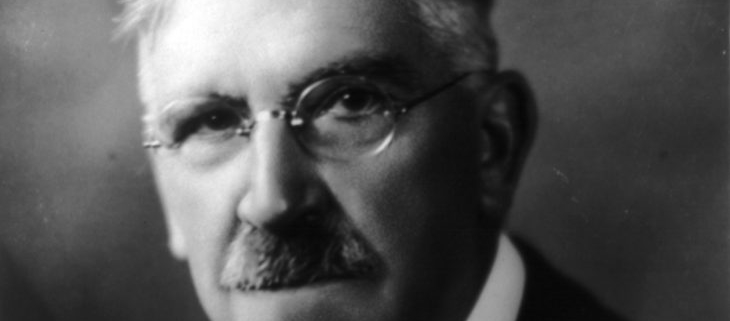John Dewey and Progressivist Education
Despite its dominance in philosophy and scientific inquiry, Enlightenment empiricism would have but minimal practical effect upon education until it manifested itself powerfully in a philosophy of education—progressivism —that came to prominence during the early years of the twentieth century.
Progressivism was largely founded by the thought and labor of John Dewey (1859-1952), a man whose mind was enraptured by the scientific method, and who expanded its use to education.[1] He took the processes of empirical science, established by such men as Sir Francis Bacon, and extended them further than most of the men of the Enlightenment would have taken them. While men such as John Locke (1632-1704) would have seen the scientific method as a means by which empiricist knowledge is gained regarding objective, physical nature, Dewey understood the scientific method as knowledge itself.[2] While at least most empiricists would have remained consistent with the ages past in holding a division between knowing and doing, Dewey abolished that division and postulated knowledge to be but mere doing.[3]He advocated a theory known as operationalism which held that knowledge is merely the scientific method in action.[4]
In his thought, Dewey reflected in many ways that of the Enlightenment philosopher Jean-Jacques Rousseau (1712-1778), who seems to have perceived the logical results of the Enlightenment better than did his contemporaries.[5] Dewey paid much heed and respect to Rousseau, who Henry T. Edmundson III described as the “single most important influence on progressive education,” both in Europe and America, although Dewey rightly criticized Rousseau’s neglect of his own children.[6] An essential point of agreement between Rousseau and Dewey was their belief in the natural goodness of man.[7]
Endorsed by pure empiricists such as John Locke, this concept of man’s innate goodness flowed naturally from the nominalist and empiricist positions.[8] In the words of Richard Weaver, “If physical nature is the totality and if man is of nature, it is impossible to think of him as suffering from constitutional evil; his defections must now be attributed to his simple ignorance or to some kind of social deprivation. One comes thus by clear deduction to the corollary of the natural goodness of man.”[9] Without universals, there is nothing to which human nature may be compared and nothing by which it may be deemed corrupted.[10] If anything is wrong with man, the ill is due to something external to man (such as a destructive environment or a lack of information) and not to man himself. Man is, as described by John Locke, born with a mind that is a tabula rasa or “blank slate,” without any natural propensity to evil.[11] The doctrine of original sin is thereby abolished.[12]
As a result of these ideas, Rousseau and Dewey promoted what has since been labeled the “child-centered” approach to education.[13] For them, education is concerned with hands-on experience and physical activities and manipulations—the only true knowledge—with an emphasis on vocational preparation.[14] They saw the rightful foundation of these endeavors as the natural impulses of the child.[15] Based upon the natural goodness of man, they charged previous education with suppressing these impulses as vices and, thereby, with suppressing the selfhood of the child.[16] These impulses should be set free from adult correction or discipline and utilized as guides for classroom activities and instruction.[17] In this way, the ideas of Dewey, reflecting those of Rousseau’s “noble savage,” led to traditional virtue and notions of sin or evil being replaced in America’s educational system by the savage’s right to be “himself,” a shift which encouraged an egocentric, i.e. selfish or prideful, approach to knowledge. The results of such a shift are all too evident in our current situation.
[1]. Clark, Gordon H. Thales to Dewey: A History of Philosophy. Grand Rapids, MI: Baker Book House, 1980, 519, 523, 525.
[2]. Ibid., 525.
[3]. Ibid., 524-525.
[4]. Ibid., 526.
[5]. Henry T. Edmondson, John Dewey & the Decline of American Education: How the Patron Saint of Schools Has Corrupted Teaching and Learning (Wilmington, DE: ISI Books, 2006), 8-9.
[6]. Ibid.
[7]. Ibid., 8.
[8]. Russell Kirk, The Roots of American Order (Washington, DC: Regnery Gateway, 1991), 406.
[9]. Richard M. Weaver, Ideas Have Consequences (Chicago: University of Chicago Press, 1984), 4-5.
[10]. Ibid., 4.
[11]. Kirk, Roots of American Order, 406.
[12]. Weaver, Ideas Have Consequences, 4.
[13]. Edmondson, John Dewey, 8.
[14]. Ibid., 8-9.
[15]. Ibid., 22.
[16]. Ibid., 8, 22, 23, 33.
[17]. Ibid., 22, 23.
DANIEL K. HUBIN resides in the Nashville, Tenn., area where he studies education, history, and literature at Welch College. He earned the Eagle Scout Award in 2014 and currently teaches U.S. government and civics to homeschool students.

